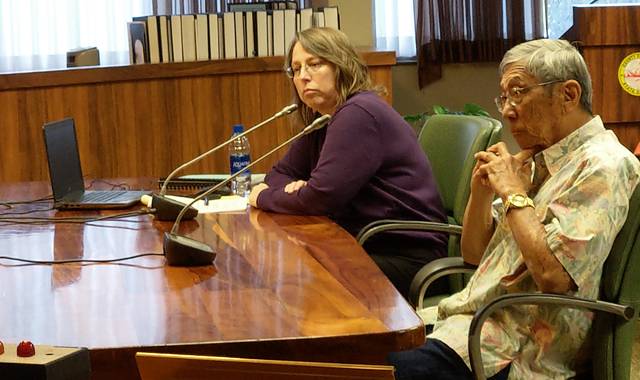A doubling and 10-year extension of the county’s general excise tax moved forward Monday on an 8-1 vote after the County Council Finance Committee heard dire warnings of property tax hikes and service cuts from Mayor Harry Kim.
Property values — the underpinning of the county budget — have not yet been set, but Finance Director Deanna Sako said costs outside the county’s control, such as collective bargaining and retirement costs of public safety employees in particular, portend another tight budget year.
Kim said his administration already cut costs, and not being able to tap into the full one-half percent of the county’s option on the GET could spell property tax hikes. There just isn’t enough money, he said.
“It’s not easy to sit down before you and say it is not there … an alternative is constantly going back to the property tax,” Kim said. “We truly feel the least harm — and all of it is harm — would be to raise the general excise tax.”
The tax hike faces two council votes and a public hearing before becoming law. It would go into effect Jan. 1, replacing the one-quarter percent GET that started just a month ago.
Several council members were dubious that raising the GET is the best course of action, but they ultimately voted to forward the measure to the council with a positive recommendation.
“I’m just hoping we’d get to the point that we’ll have a budget and don’t have to raise anything,” said Finance Committee Chairwoman Maile David, who represents South Kona/Ka‘u.
Kohala Councilman Tim Richards was the sole “no” vote. He’s not convinced the county has done all it can to manage costs and he wanted to hear some numbers before approving more taxes.
“When I took office, the budget was $461 million; now it’s $518 million, a 13 percent increase,” Richards said. “I’m not supportive of any tax increase if I don’t know what the budget is. … Every budget, we’re raising taxes, raising taxes and I have an issue with that.”
Increasing the GET will bring an anticipated $50 million annually, compared to the current $25 million annually. The county is lobbying the state Legislature to give it more flexibility in how the money is spent so it doesn’t have to be used solely for roads, mass transit and trails.
The county’s one-half cent GET would be in addition to the state’s 4-cent tax. The county share would add 52 cents to a $100 bag of groceries, with the county share costing $100 annually to a household spending $20,000 on eligible expenses or $250 for those spending $50,000.
The tax is charged on most everything, except for federal food assistance programs such as SNAP food stamps and the WIC program, prescription drugs and prosthetic devices. It’s estimated that tourists pick up 25 percent to 35 percent of the tax.
Proponents of the GET hike include nonprofits such as the Hawaii Public Health Institute, Peoples Advocacy for Trails Hawaii and Blue Zones Project. The county is woefully behind on making roads safe for all modes of transportation because there’s never enough money, advocates said.
“Mass transit has to happen so the poor can get to jobs,” said Carol Ignacio, Blue Zones government and community affairs manager. “Plans, plans, plans. We need some action.”
Opponents include business groups such as Hawaii Island Board of Realtors and the Kohala Coast Resort Association. Increasing the GET will increase the cost of living for residents and tourists alike, they said.
“Any increase in the general excise tax is an increase to all citizen’s cost of living as well as their cost of doing business,” said Joy Dillon, a co-chair for the Board of Realtors government affairs committee.
Stephanie Donoho, administrative director for the Kohala Coast Resort Association, said the county should start by enforcing existing laws, addressing inefficiencies and making vacation rental operations pay equivalent property taxes as well as transient accommodations taxes and GET. Donoho pointed to a recent Hawaii Tourism Authority report that she said showed 13,396 transient vacation rental rooms on the Big Island compared to 6,110 hotel rooms.
“They are not paying same property tax as our resorts are and those should be addressed first,” Donoho said. “The visitor industry has been hit very hard in the last year. … We are doing our level best keeping the 5,000 people employed.”
Email Nancy Cook Lauer at ncook-lauer@westhawaiitoday.com.






